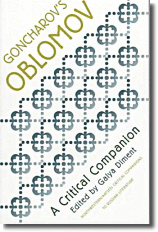". . . [Goncharov] is ten heads above me in talent."—Anton Chekov"Oblomov is a truly great work, the likes of which one has not seen for a long, long time. ... I am in rapture over Oblomov and keep rereading it."—Leo Tolstoy
How many novels can boast praise like that?
Ivan Goncharov's Oblomov, first published in 1859, has just been reissued in a new translation by Stephen Pearl with an Introduction by Galya Diment and Foreword by Tatyana Tolstaya.
I shamelessly asked Galya Diment to put aside her own work--she is professor and chair of the department of Slavic Languages and Literatures at the University of Washington--and apply the "page 69 test" to Oblomov. She generously agreed to help; here is her reply:
Many thanks to Galya for her treatment of the question.Page 69 of Oblomov foresees most of the major developments in the novel while capturing a rather typical day in the life of Ilya Ilyich Oblomov. The protagonist, reclining on his couch, as always, is visited by his doctor who is urging him to dramatically change his sedentary lifestyle, to stop “brooding” because it leads to a “mental stress,” and to engage in “light conversation, especially with ladies.” This is of course the same instructions that he will later get from his closest friend Stoltz, whose advice, unlike that of the doctor, he will accept, albeit still reluctantly. He thus will – at least for a while – attempt to leave his couch more often and to brood less by having more productive thoughts about important issues, like bettering the conditions of his serfs. He also will, of course, engage in conversations, light and otherwise, with a new “lady” in his life: Olga.
The doctor’s suggestions that Oblomov should go abroad will not be heeded even when they are supported by Stoltz, and in that, too, this page is very symbolic of the novel as a whole. It is Stoltz, Oblomov’s half-German, half-Russian childhood friend, who is comfortable shuttling between the two worlds, Europe and Russia. Oblomov, as a “pure” and “true” Russian, is not. His “pure” and “true” Russian apathy makes him content to limit the space his body inhabits to an “Asiatic” robe and a couch in his Petersburg apartment.
This page also reveals another essential, and to some, unexpected, aspect of Oblomov: he is a not a caricature but, in fact, a very likable character who is smart and has a well-defined sense of irony. While the doctor spouts good practical advice with which we, as readers, may find it easy to agree, at least in the most general terms, Oblomov’s cutting remarks stop us in our tracks for they underscore the shallowness of the doctor’s character. When the physician recommends Paris, with its “theatres, balls, fancy-dress parties… noise, laughter,” Oblomov interrupts him with a sarcastic question: “You are not leaving anything out by any chance?” But Oblomov’s sarcasm is lost on the not-so-bright doctor who responds in all seriousness: “Well, a little sea air wouldn’t hurt…”
All in all not a bad page at all for giving the reader a taste for this marvelous, intelligent, and witty novel!

Oblomov fans interested in learning more about the novel may consult Goncharov's "Oblomov": A Critical Companion, edited by Professor Diment.
Diment is also the author of Pniniad: Vladimir Nabokov and Marc Szeftel (University of Washington Press) and The Autobiographical Novel of Co-Consciousness: Goncharov, Woolf, and Joyce (University Press of Florida).
Last month I linked to Gary Shteyngart's recent homage to Oblomov. As I indicated in that post, while I do not rate Goncharov with the best of Tolstoy--I don't rate anyone with the best of Tolstoy--Oblomov is one of those great books that even readers who avoid so-called "classics" will likely enjoy.
Previous "page 69 tests":
Maureen Ogle, Ambitious Brew
Cass Sunstein, Infotopia
Paul W. Kahn, Out of Eden
Paul Lewis, Cracking Up
Pagan Kennedy, Confessions of a Memory Eater
David Greenberg, Nixon's Shadow
Duane Swierczynski, The Wheelman
George Levine, Darwin Loves You
John Barlow, Intoxicated
Alicia Steimberg, The Rainforest
Alan Wolfe, Does American Democracy Still Work?
John Dickerson, On Her Trail
Marcus Sakey, The Blade Itself
Randy Boyagoda, Governor of the Northern Province
John Gittings, The Changing Face of China
Rachel Kadish, Tolstoy Lied
Eric Rauchway, Blessed Among Nations
Tim Brookes, Guitar and other books
Ruth Padel, Tigers in Red Weather
William Haywood Henderson, Augusta Locke
Jed Horne, Breach of Faith
Robert Greer, The Fourth Perspective
David Plotz, The Genius Factory
Michael Allen Dymmoch, White Tiger
Patrick Thaddeus Jackson, Civilizing the Enemy
Tom Lutz, Doing Nothing
Libby Fischer Hellmann, A Shot To Die For
Nelson Algren, The Man With the Golden Arm
Bob Harris, Prisoner of Trebekistan
Elaine Flinn, Deadly Collection
Louise Welsh, The Bullet Trick
Gregg Hurwitz, Last Shot
Martha Powers, Death Angel
N.M. Kelby, Whale Season
Mario Acevedo, The Nymphos of Rocky Flats
Dominic Smith, The Mercury Visions of Louis Daguerre
Simon Blackburn, Lust
Linda L. Richards, Calculated Loss
Kevin Guilfoile, Cast of Shadows
Ronlyn Domingue, The Mercy of Thin Air
Shari Caudron, Who Are You People?
Marisha Pessl, Special Topics in Calamity Physics
John Sutherland, How to Read a Novel
Steven Miles, Oath Betrayed
Alan Brown, Audrey Hepburn's Neck
Richard Dawkins, The Ancestor's Tale
--Marshal Zeringue





